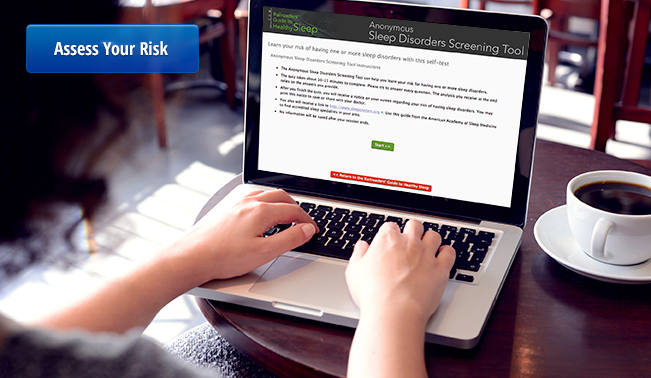Anonymous Sleep Disorders Screening Tool
SORRY!
This page is currently under
construction.
Please check back soon!
Do you suffer from the "snoring sickness"? Use the Anonymous Sleep Disorders Screening Tool to discover your risk of having one or more sleep disorders.
If there is a railroader in your life, encourage him or her to complete the Anonymous Sleep Disorders Screening Tool. You may also want to take it yourself, to assess your own sleep.
This tool can help you discover your risk for having one or more sleep disorders. Use it to assess symptoms, such as trouble falling asleep and staying asleep, or snoring. When you exit the tool, any information you entered is automatically
deleted.

People ideally go to bed when sleepy, fall asleep quickly, sleep soundly, and awaken feeling refreshed. If you work an on-call schedule, have variable hours, or even work a regular shift, but have responsibilities at home or elsewhere, you likely must sleep at different times from day to day. As a result, you sometimes may find it hard to fall asleep or stay asleep, and to get all the sleep you need.
Sleep disorders may disrupt sleep without the sleeper’s knowing something is wrong. People with sleep disorders may awaken briefly dozens, even hundreds of times, without remembering these awakenings later. They may sense only that they slept poorly, or they may feel sleepy when awake. A bed partner bothered by loud snoring, frequent kicks, or flailing about may be the first to recognize the problem.
Sleep experts have identified more than 60 different sleep disorders that disrupt both sleep and wakefulness. An estimated 50-70 million Americans have one or more of these disorders. Fortunately, effective treatment is available to help people sleep better, and feel better while awake.
The Anonymous Sleep Disorders Screening Tool can help you discover your risk for having one or more sleep disorders. Use it to assess symptoms, such as trouble falling asleep and staying asleep, or snoring.
If you have a sleep disorder, and start appropriate treatment, you may reduce your odds of falling asleep at work or on the road. Treatment also may help you avoid medical illnesses linked to poor sleep, including high blood pressure, heart disease, stroke, and diabetes.
Your answers to this quiz will generate an estimate of your risk of having one or more sleep disorders. You may print the message you receive, once you complete it, to share with your healthcare provider.
When you exit, any information you entered is automatically deleted. No record of your answers is kept. This information is for you to use as you wish.
After completing the quiz, you will receive a link to http://www.sleepcenters.org. This guide from the American Academy of Sleep Medicine can help you find accredited sleep specialists in your area.
Frequently Asked Questions
Q: What does taking this quiz involve?
A: When you click the link to the quiz, your web browser will redirect you to a secure Brigham and Women's Hospital website. The quiz takes about 10-15 minutes to complete.
It asks about your experience with common symptoms of sleep disorders, such as snoring, or feeling a recurrent urge to move your legs when you sit or lie down.
After you complete the quiz, a computer program will review your answers. It will estimate your risk of having one or more sleep disorders, and provide a notice on your screen telling you if you are at risk. You may print this notice to share with your healthcare provider.
You also will receive a link to http://www.sleepcenters.org. Use this guide from the American Academy of Sleep Medicine to find accredited sleep specialists in your area.
Q: Will personal information be collected or saved by the screening tool?
A: No. The screening tool is completely anonymous. All the information you enter is automatically deleted when you exit the quiz. If you cannot complete the questions in one sitting and choose to return later, you will need to start over.
Q: I sleep fine. Why should I complete this quiz?
A: It's easy to overlook symptoms that occur only or mainly while you sleep. The quiz will ask about your sleep in a typical week and on vacations. Taking the quiz may alert you to a pattern of symptoms you may wish to discuss with your healthcare provider.
Q: I already know I have a sleep disorder. I'm receiving treatment for it. Why should I take this quiz?
A: People with one sleep disorder may be at risk for others. Taking the quiz may help alert you to new or different symptoms to discuss with your healthcare provider.
Q: Suppose I learn I am at risk for a sleep disorder, but do not wish to see a doctor?
A: Even if you decide not to seek medical help now, pay attention to possible symptoms. If your problems persist, retake the quiz in a few months. When you next see your healthcare provider, discuss these problems.
Q: Who will have access to my replies to the quiz?
A: Only you. No information will be saved after your session ends.
 Railroaders' Guide to Healthy Sleep
Railroaders' Guide to Healthy Sleep